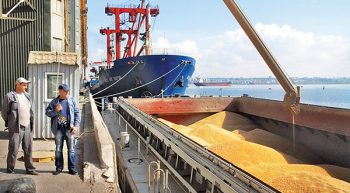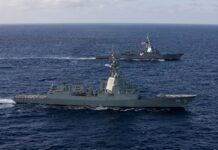
By Norman Friedman*
This year, as for the past two, Russia is the world’s largest wheat exporter. That recalls the situation before 1914 — before the Soviets wrecked Russian agriculture. The pre-1914 situation, and its World War I sequel, have current naval resonance, because sea power is often largely about the reality that bulk goods, like wheat, travel most efficiently by sea.
Now, as in 1914, Russian wheat reaches the world mainly through the Black Sea ports, which means mainly via the Turkish Straits at the mouth of the Black Sea. Food, mainly wheat, is now Russia’s second most important export product, behind oil but ahead of arms.
We often think of sea power in terms of strikes against land targets, but historically what has mattered much more has been the protection or disruption of trade, which often means the flow of important commodities. The most recent war against trade was the tanker war prosecuted by Iran and Iraq between 1980 and 1988. When we see the rise of the Chinese navy, we should keep in mind that it has been justified to the Chinese government largely by increasing Chinese dependence on imports of bulk goods, largely oil and food, via the sea. The current face-off with China is fundamentally different from the Cold War confrontation with the Soviet Union, because China relies heavily on access to world resources. The Soviets did not, even though their agricultural failures forced them to import wheat on a massive scale. Chinese reliance on the sea shifts any maritime confrontation into historically familiar territory. By way of contrast, until the 1980s, and the rise of the Soviet strategic submarine force as a vital interest, through much of the Cold War the U.S. Navy struggled to find maritime leverage against the Soviet Union. Once it found leverage, the Maritime Strategy could be implemented.
Historical experience matters because we can see how various possible strategies actually played out. In World War I, it seems that the failure to keep Russian access (via the Turkish Straits) open had enormous consequences. Unfortunately few then or later appreciated the maritime dimension of the situation.
In 1914 wheat was the main Russian export product, accounting for almost half of national income. It came from the fertile ‘black soil’ of southern Russia, including what is now Ukraine. As a consequence, the best-developed Russian ports were on the Black Sea. Moreover, the only other major Russian ports, on the Baltic, were blocked by Germany. In October 1914 Turkey declared war on the Allies, blocking the straits through which Russian wheat normally flowed.
The British Government of the time had fumbled an attempt to keep Turkey out of the war, even welcoming the possibility that the famously corrupt Turkish state could be brought down. Turkey had performed poorly in the recent Balkan Wars, and it seems to have been taken for granted that the country could easily collapse. There was also an ideological element. For years Europeans had supported the struggles of Christians within the Turkish empire; now it seemed that they would soon be liberated. British Prime Minister Asquith wrote that he was grateful that the Turks had declared war.
For their part, the Germans, who advised the Turkish army, succeeded in tipping the Turks into the war. They too saw things ideologically. The Turkish Sultan was, at least in theory, the Caliph ruling the world’s Muslims. The British and French Empires contained hundreds of millions who, in theory, could join the Turks in a holy war.
No one thought about the maritime reality, that Turkey was the gate which could very nearly cut Russia, and its wheat, off from the world. In the fall of 1914 that began to count, as the world wheat harvest proved worse than expected. All governments feared instability due to rising bread prices. The big Russian harvest could make up the difference, but it was blocked by the Turks. British Prime Minister Asquith was moved to write that it would be easier to storm the Dardanelles – the Turkish Straits – than to raise the price of bread in England.
By the time the British and French did try to storm the Dardanelles, the connection with bread and with the Russian economy had largely been forgotten. It has certainly been forgotten since. The operation was badly botched, and many historians have dismissed it as a pointless failure. The consequences of failure suggest that it should have been viewed instead as a crucial opportunity lost.
To the British, the Russians had a vital strategic role. In 1914 the Cabinet imagined that the ‘Russian steamroller’ would overrun Germany while the British and the French fought a holding action on the Western Front. The real inadequacies of the Russian army were ignored. It seems arguable that they might have been cured, or at least alleviated, had access through the Turkish Straits been maintained. They would have been a vital conduit for weapons, ammunition, and even British and French troops to stiffen the Russians. The remaining Russian ports, in the Arctic and in the Far East, were far too limited.
The maritime failure at Gallipoli – at the Straits — had enormous consequences. Without income from their exports, the Russians could not continue their war without massive borrowing in Europe, mainly in England. Their economy tottered. The Russian war effort failed for all sorts of reasons, but it seems fair to say that being cut off from Allied help – and from cash – made things far worse. Quite possibly, had the assault on the Turkish straits succeeded, Russia would not have collapsed into revolution. The need to raise money to prop up a Russia unable to sell her main export badly damaged the British economy, to the point that by 1917 Britain would have found it difficult to continue without American loans. Those loans generated bitterness which helped make it difficult for the United States to back the British when they faced Hitler in 1939. For that matter, the failure of the ‘Russian steamroller’ helped draw the British into a ruinous war in France. The failure at Gallipoli is hardly the whole story, but it was far more important than most historians have imagined. In hindsight, what stands out is the scarcity of strategic vision in the British Cabinet of the time, particularly in any explicit understanding of the maritime dimension.
That was then. What about now? For China it is not so much what goes out by sea as what had to come in to keep the country alive. The Chinese equivalent of the Turkish Straits is probably a combination of the Malacca Straits and the South China Sea, and it seems clear that the current Chinese leadership is alive to what those two choke points mean. The ‘one belt, one road’ initiative is intended to bypass the Malacca Straits, moving trade to ports on the Bay of Bengal. It is, however, unlikely that the road and rail net can replace large bulk carriers going into ports closer to Chinese consumers. In any case, the seaborne flow of vital commodities offers the sort of leverage which has been so important in past maritime wars.
The role of the choke points may well explain why the Chinese are applying so much pressure on the relatively weak governments which control them, such as the Indonesians, the Vietnamese, and the Filipinos. To some extent our current policy of showing that our striking fleet cannot be kept out of the area is an attempt to stiffen them. However, we have neglected the leverage the Chinese offer in the form of the flow through the choke points and Chinese-controlled ports.
We always ask how to deter war and, if necessary, apply sufficient pressure to end it on favorable terms. China presents few land targets the destruction of which would be decisive. The one decisive target, the leadership in Beijing, cannot be attacked short of mutually disastrous central war. The ability of our striking forces, particularly our carriers, to survive and operate near China is much more important as a way of stiffening allies who themselves control (at least nominally) the important choke points.
The step beyond is a credible threat to block the choke points and the commodity flow even if the Chinese succeed in terrorizing the states through whose waters the ships pass. Such sea denial seems a lesser form of sea power than sea control. However, the two can be – should be — mutually supportive. Through the Cold War the West learned just how expensive sea control could be in the face of a powerful modern sea denial force – submarines and long-range missile bombers. At the end of the Cold War, the U.S. Navy’s Maritime Strategy solved the problem by leveraging the absolute Soviet need to control the seas in which its ballistic missile submarines operated. In the Chinese case, a need to spend a lot more on dealing with our sea denial threat will leave a lot less with which to attack our sea control or power projection forces – our carriers, for example.
In World War I, the Germans and the Turks managed an effective form of sea denial, in the Turkish Straits, probably without ever considering how important it could be. Historical analysis reveals how much they gained, and how much their tactics cost the Allies. It shows an important current Chinese vulnerability, which at the least we should be able to threaten to exploit.
None of this is to suggest that we should be threatening to choke off Chinese merchant traffic in peacetime. It is to suggest that if we contemplate some crisis, we ought to exploit the sort of vulnerability the Germans and the Turks used against the Russians in 1914-15 – with devastating effects later on. World War I was a maritime war, but far too often it is seen mainly as a land war in which the maritime aspect was successful support of the army on the Western Front. In 1980 that was much the view of a possible NATO war. It took the U.S. Navy to show that the world was a lot more maritime, and that maritime pressure could radically change the situation. Now it is up to the U.S. Navy to look at the problem presented by China in a much more maritime way.
 * Norman Friedman is author of The Naval Institute Guide to World Naval Weapon Systems. His column is published with kind permission of the US Naval Institute.
* Norman Friedman is author of The Naval Institute Guide to World Naval Weapon Systems. His column is published with kind permission of the US Naval Institute.



